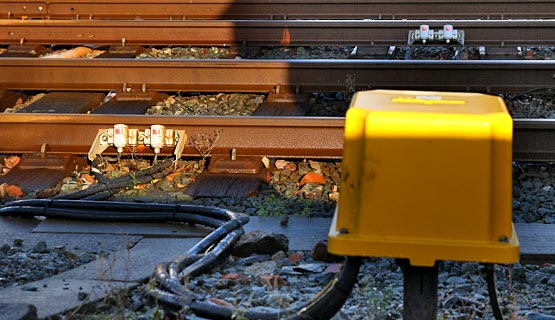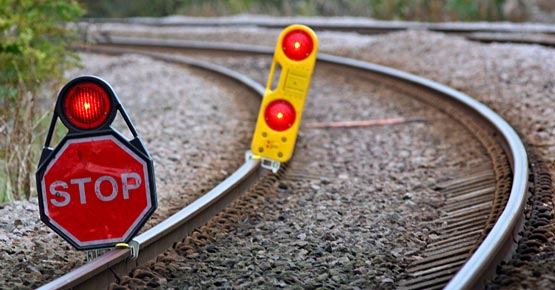|
It’s a funny thing ‘efficiency’, largely because it’s so woolly. It’s a relative, not an absolute. How, for example, do you determine the efficiency of a safety professional? They can earn very decent salaries - certainly compared with your average trackworker - and yet they rarely contribute to making the railway run more cheaply, or shorten the time it takes to achieve something. Indeed you might argue that the opposite generally applies.
For almost two decades, many safety professionals have extolled the virtues of green zone working, or whatever we’re meant to call it now that it no longer features in the Rule Book. HMRI, when it was under the poisonous influence of the HSE, was besotted with it. And senior managers don’t need much encouragement to commend its benefits, even if they only rarely back up their words with action to drive its use.
Things changed of course with Rimini. Decision-making that leads to the choice of safe system now has to be justified and documented. Whilst that’s undoubtedly made life more onerous bureaucratically, has it made a positive difference in safety terms? If nothing else, it has dislodged red zone working from its position as default protection for maintenance. Many will regard that as a good thing - and perhaps it is. But it has also brought about the perverse and hugely inefficient scene I witnessed a few weeks ago. And you can be confident that dozens of similar pantomimes are being performed across parts of the network even as you read this.

I had a minor photographic assignment. Nothing exciting; nothing difficult - just taking pictures of new equipment installed lineside and in the four-foot of a rural, largely single-track branch. It never accommodates freight; passenger services run each way on a two-hourly cycle. My site of work was at a station with a passing loop. I could have applied for a T12 - or whatever we’re meant to call that now - but I saw no purpose in denying someone else the opportunity to block the line in case they had more substantive work to undertake. Yes I know - a scurrilous non-compliance. But as it came to pass, I wouldn’t have got a blockage anyway. Someone else already had one.
When I arrived, a gang of four S&T men were installing plastic pipes beneath the loop’s two tracks. In their van was a fifth man wearing a PC armlet. I walked onto the platform, said hello to the COSS who mentioned that both lines were blocked, and got on with my business. A couple of minutes later, they retired to the van.
I needed a shot of a train - due in half-an-hour - so I walked next door to Tesco, bought a sandwich and returned to eat it in my car. The service was running 40 minutes late thanks to signalling problems but it eventually came and went. I took a few more pictures, then packed my gear away. At that point, the gang emerged from their refuge and set about fitting more pipes. “Good dinner?” I asked the COSS. “We’ve not had dinner. We were waiting for that train to go through; we had to give up the block for it.”
The sighting distance in the direction from which the train came was about two miles, though only about 600 yards the other way; linespeed was 55mph. In red zone terms, it was a paradise. There was as close to being no risk as you can find in the real world. Yet five men spent more than an hour sitting on their backsides - time within which they could have finished the job - because the paperwork stipulated green zone working, a system from which they derived no safety benefit, just the extra ball-ache of setting it up. Its selection was not hazard-based - quite the opposite. If there had been a frequent train service - bringing with it more risk - they would not have been granted a blockage. But here, because trains were like hen’s teeth, the audit trail would only support safeguarded green. Compliance triumphed over common sense and necessity; efficiency took a beating.
|
| Compliance triumphed over common sense and necessity; efficiency took a beating. |
|
Yes, efficiency is a woolly thing. Sir Roy McNulty’s study into the value for money delivered by our industry - unveiled in its interim form last September - found that Network Rail’s expenditure in 2006/7 delivered 30-50% less than comparable European railways. Annual savings of up to £1 billion could be achieved by 2018/19 over and above the DfT’s current projection for that year but only if step-change improvements are made in terms of leadership, interfaces, planning, decision-making, innovation…management in general.
Another assignment with my camera served to illustrate this. At 22:00hrs, 20 men turned up at their signing-on point for a night shift on a major project. The first hour and a quarter was spent enduring probably the worst safety brief I have ever witnessed: regurgitating verbatim a sheaf of notices - mostly of questionable relevance - was a guy whose charisma threatens the livelihood of every NHS anaesthetist. By the end, most of his audience had quietly slipped into a coma.
Those who were able then headed off to site. Once there, they stood around for 80 minutes waiting for the day’s last train to pass through. Almost half-an-hour later, the possession had been taken and they were invited onto the track. It was now 01:15hrs. At 04:00hrs, they started to pack-up in preparation for the block being handed back. Having paid for at least 160 man-hours, the industry benefited from about 55 man-hours of actual graft. No sign of an ATWS or attempt at single line working. The project was configured entirely within the constraints of the timetable…screw the budgetary consequences.

In the 13 years I’ve been involved with workforce safety, the industry has relentlessly declared its commitment to changing possession rules, making them quicker and simpler to take and give-up. Committees have sat, reports been written and trials performed. August 1999 threatened substantive rule changes…but they were withdrawn at the last minute. TOP (Track Occupancy Permits), of which much was hoped, disappeared into oblivion. Professionalising possession management has certainly reduced irregularities but what’s happened to the promised - and much-needed - efficiency revolution?
The world has changed since the coalition took power. Within the public sector, tens of thousands are being jettisoned to rescue the country’s finances. And yet the railway wilfully thrusts money down the toilet in its quest to comply with disproportionate standards - often developed by suits with little practical nous - and an unwillingness to innovate or challenge the status quo. It’s an unsustainable approach for which the railway will ultimately pay the price. Unless it’s prepared to put its own house in order, politicians will do the job for it. And no-one should underestimate the pain that process would inflict.
Story added 1st March 2011
|